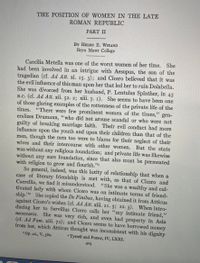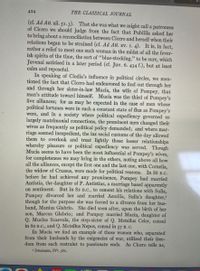
Social Psychology (10th Edition)
10th Edition
ISBN: 9780134641287
Author: Elliot Aronson, Timothy D. Wilson, Robin M. Akert, Samuel R. Sommers
Publisher: Pearson College Div
expand_more
expand_more
format_list_bulleted
Question
Pick 5 quotes why this article does not help understand the role of women during this period. DONT REJECT PLEASE ALLOW SOMEONE ELSE TO ANSWER.

Transcribed Image Text:**The Position of Women in the Late Roman Republic: Part II**
*By Helen E. Wieand, Bryn Mawr College*
Caecilia Metella was one of the most notorious women of her time. She had been involved in an affair with Aesopus, the son of the tragedian (cf. Ad Att. xi. 15. 3); and Cicero believed that it was the evil influence of this man upon her that led her to ruin Dolabella. She was divorced from her husband, P. Lentulus Spinther, in 45 B.C. (cf. Ad Att. xii. 52. 2; xiii. 7. 1). She seems to have been one of those glaring examples of the rottenness of the private life of the times. "There were few prominent women of the times," generalizes Drumann, "who did not arouse scandal or who were not guilty of breaking marriage faith. Their evil conduct had more influence upon the youth and upon their children than that of the men, though the men too were to blame for their neglect of their wives and their intercourse with other women. But the state was without any religious foundation; and private life was likewise without any sure foundation, since that also must be permeated with religion to grow and flourish."
So general, indeed, was this laxity of relationship that when a case of literary friendship is met with, as that of Cicero and Caerellia, we find it misunderstood. "She was a wealthy and cultivated lady with whom Cicero was on intimate terms of friendship." She copied the De Finibus, having obtained it from Atticus against Cicero's wishes (cf. Ad Att. xiii. 21. 5; 22. 3). When introducing her to Servilius Cicero calls her "my intimate friend," necessaria. She was very rich, and even had property in Asia (cf. Ad Fam. xiii. 72); and Cicero seems to have borrowed money from her, which Atticus thought was inconsistent with his dignity.
Reference: Op. cit., V, 380.
Tyrrell and Purser, IV, LXXI.
Page 423

Transcribed Image Text:**The Classical Journal**
Page 424
(cf. Ad Att. xii. 51. 3). That she was what we might call a patroness of Cicero we should judge from the fact that Publilia asked her to bring about a reconciliation between Cicero and herself when their relations began to be strained (cf. Ad Att. xv. 1. 4). It is, in fact, rather a relief to meet one such woman in the midst of all the feverish spirits of the time, the sort of “blue-stocking,” to be sure, which Juvenal satirized in a later period (cf. Juv. 6. 434 f.), but at least calm and reposeful.
In speaking of Clodia’s influence in political circles, we mentioned the fact that Cicero had endeavored to find out through her and through her sister-in-law Mucia, the wife of Pompey, that man’s attitude toward himself. Mucia was the third of Pompey’s five alliances; for as may be expected in the case of men whose political fortunes were in such a constant state of flux as Pompey’s were, and in a society where political expediency governed so largely matrimonial connections, the prominent men changed their wives as frequently as political policy demanded; and where marriage seemed inexpedient, the lax social customs of the day allowed them to overlook and treat lightly those looser relationships whereby pleasure or political expediency was served. Though Mucia seems to have been the most influential of Pompey’s wives, for completeness we may bring in the others, noting above all how all the alliances, except the first one and the last one, with Cornelia, the widow of Crassus, were made for political reasons. In 86 B.C. before he had achieved any prominence, Pompey had married Antistia, the daughter of P. Antistius, a marriage based apparently on sentiment. But in 82 B.C., to cement his relations with Sulla, Pompey divorced her and married Aemilia, Sulla’s daughter, though for the purpose she was forced to a divorce from her husband, Manius Glabrio. She died soon after, upon the birth of her son, Marcus Glabrio; and Pompey married Mucia, daughter of Q. Mucius Scaevola, the step-sister of Q. Metellus Celer, consul in 60 B.C., and Q
Expert Solution
This question has been solved!
Explore an expertly crafted, step-by-step solution for a thorough understanding of key concepts.
This is a popular solution
Trending nowThis is a popular solution!
Step by stepSolved in 2 steps

Knowledge Booster
Recommended textbooks for you
 Social Psychology (10th Edition)SociologyISBN:9780134641287Author:Elliot Aronson, Timothy D. Wilson, Robin M. Akert, Samuel R. SommersPublisher:Pearson College Div
Social Psychology (10th Edition)SociologyISBN:9780134641287Author:Elliot Aronson, Timothy D. Wilson, Robin M. Akert, Samuel R. SommersPublisher:Pearson College Div Introduction to Sociology (Eleventh Edition)SociologyISBN:9780393639407Author:Deborah Carr, Anthony Giddens, Mitchell Duneier, Richard P. AppelbaumPublisher:W. W. Norton & Company
Introduction to Sociology (Eleventh Edition)SociologyISBN:9780393639407Author:Deborah Carr, Anthony Giddens, Mitchell Duneier, Richard P. AppelbaumPublisher:W. W. Norton & Company The Basics of Social Research (MindTap Course Lis...SociologyISBN:9781305503076Author:Earl R. BabbiePublisher:Cengage Learning
The Basics of Social Research (MindTap Course Lis...SociologyISBN:9781305503076Author:Earl R. BabbiePublisher:Cengage Learning Criminalistics: An Introduction to Forensic Scien...SociologyISBN:9780134477596Author:Saferstein, RichardPublisher:PEARSON
Criminalistics: An Introduction to Forensic Scien...SociologyISBN:9780134477596Author:Saferstein, RichardPublisher:PEARSON Sociology: A Down-to-Earth Approach (13th Edition)SociologyISBN:9780134205571Author:James M. HenslinPublisher:PEARSON
Sociology: A Down-to-Earth Approach (13th Edition)SociologyISBN:9780134205571Author:James M. HenslinPublisher:PEARSON Society: The Basics (14th Edition)SociologyISBN:9780134206325Author:John J. MacionisPublisher:PEARSON
Society: The Basics (14th Edition)SociologyISBN:9780134206325Author:John J. MacionisPublisher:PEARSON

Social Psychology (10th Edition)
Sociology
ISBN:9780134641287
Author:Elliot Aronson, Timothy D. Wilson, Robin M. Akert, Samuel R. Sommers
Publisher:Pearson College Div

Introduction to Sociology (Eleventh Edition)
Sociology
ISBN:9780393639407
Author:Deborah Carr, Anthony Giddens, Mitchell Duneier, Richard P. Appelbaum
Publisher:W. W. Norton & Company

The Basics of Social Research (MindTap Course Lis...
Sociology
ISBN:9781305503076
Author:Earl R. Babbie
Publisher:Cengage Learning

Criminalistics: An Introduction to Forensic Scien...
Sociology
ISBN:9780134477596
Author:Saferstein, Richard
Publisher:PEARSON

Sociology: A Down-to-Earth Approach (13th Edition)
Sociology
ISBN:9780134205571
Author:James M. Henslin
Publisher:PEARSON

Society: The Basics (14th Edition)
Sociology
ISBN:9780134206325
Author:John J. Macionis
Publisher:PEARSON